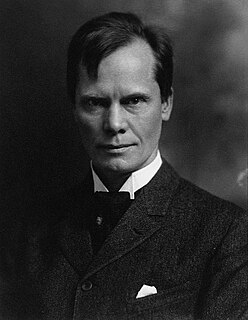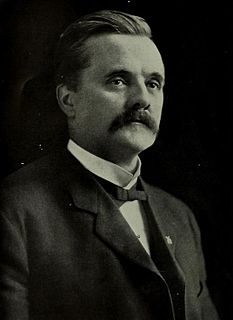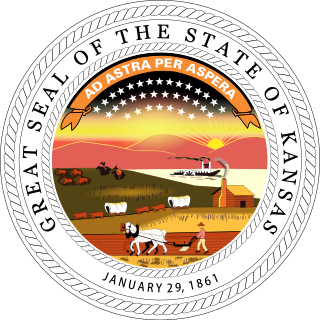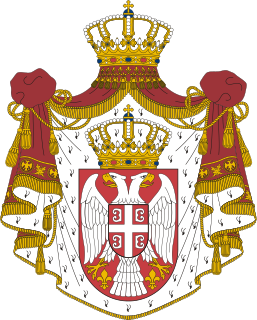Related Research Articles

The Seventeenth Amendment to the United States Constitution established the direct election of United States senators in each state. The amendment supersedes Article I, §3, Clauses 1 and 2 of the Constitution, under which senators were elected by state legislatures. It also alters the procedure for filling vacancies in the Senate, allowing for state legislatures to permit their governors to make temporary appointments until a special election can be held.
Single non-transferable vote or SNTV is an electoral system used in multi-member districts. It is a generalization of first-past-the-post, applied to multi-member districts. Unlike single-winner First past the post, in SNTV multiple members are elected in each district. Unlike block voting, where each voter casts multiple votes, under SNTV each voter casts just one vote. The combination of single voting and multi-member districts produces mixed representation and thus proportional representation or semi-proportional representation at the district level.

Direct democracy or pure democracy is a form of democracy in which the electorate decides on policy initiatives without elected representatives as proxies. This differs from the majority of currently established democracies, which are representative democracies. The theory and practice of direct democracy and participation as its common characteristic was the core of work of many theorists, philosophers, politicians, and social critics, among whom the most important are Jean Jacques Rousseau, John Stuart Mill, and G.D.H. Cole.

Hiram Warren Johnson was an American attorney and politician who served as the 23rd governor of California from 1911 to 1917. Johnson achieved national prominence in the early 20th century. He was elected in 1916 by the state legislature as the United States Senator from California, where he was repeatedly re-elected and served until 1945.
Third party is a term used in the United States for American political parties other than the two dominant parties, currently the Republican and Democratic Parties. Sometimes the phrase "minor party" is used instead of third party.
An election with electoral delegates is an election in which voters do not choose between candidates for an office, but elect people who then choose. It is one of the oldest forms of elections and is used by many countries for heads of state, cabinets, heads of government, and/or upper houses. It is also used for some supranational legislatures.

William Sulzer was an American lawyer and politician, nicknamed Plain Bill Sulzer. He was the 39th Governor of New York and a long-serving congressman from the same state.

George William Norris was an American politician from the state of Nebraska in the Midwestern United States. He served five terms in the United States House of Representatives as a Republican, from 1903 until 1913, and five terms in the United States Senate, from 1913 until 1943. He served four terms as a Republican and his final term as an independent. Norris was defeated for re-election in 1942.
In the politics of the United States, the process of initiatives and referendums allow citizens of many U.S. states to place new legislation, or to place legislation that has recently been passed by a legislature on a ballot for a popular vote. Initiatives and referendums, along with recall elections and popular primary elections, are signature reforms of the Progressive Era; they are written into several state constitutions, particularly in the West. It is a form of direct democracy.
Nonpartisanism is a lack of affiliation with, and a lack of bias toward, a political party.

William Simon U'Ren was an American lawyer and political activist. U'Ren promoted and helped pass a corrupt practices act, the presidential primary, and direct election of U.S. senators. As a progressive, U'Ren championed the initiative, referendum, and recall systems in an effort to bring about a Georgist "Single Tax" on the unimproved value of land, but these measures were also designed to promote democracy and weaken the power of backstage elites. His reforms in Oregon were widely copied in other states. He supported numerous other reforms, such as the interactive model of proportional representation, which was not enacted.

In the 1912 and 1913 United States Senate elections, Democrats gained control of the Senate from the Republicans. Of the 32 seats up for election, 17 were won by Democrats, thereby gaining 4 seats from the Republicans. Two seats were unfilled by state legislators who failed to elect a new senator on time. They were the last Senate elections held before ratification of the 17th Amendment, which established direct elections for all seats in the Senate.

The Progressive Party was a third party in the United States formed in 1912 by former president Theodore Roosevelt after he lost the presidential nomination of the Republican Party to his former protégé rival, incumbent president William Howard Taft. The new party was known for taking advanced positions on progressive reforms and attracting leading national reformers. After the party's defeat in the 1912 presidential election, it went into rapid decline in elections until 1918, disappearing by 1920. The Progressive Party was popularly nicknamed the "Bull Moose Party" when Roosevelt boasted that he felt "strong as a bull moose" after losing the Republican nomination in June 1912 at the Chicago convention.

The Kansas Legislature is the state legislature of the U.S. state of Kansas. It is a bicameral assembly, composed of the lower Kansas House of Representatives, with 125 state representatives, and the upper Kansas Senate, with 40 state senators. Representatives are elected for two-year terms, senators for four-year terms.

Harry Lane was an American politician in the state of Oregon. A physician by training, Lane served as the head of the Oregon State Insane Asylum before being forced out by political enemies. After a decade practicing medicine the progressive Democrat Lane won election as the mayor of Portland in 1905, gaining re-election in 1907. Lane's tenure in office was largely ineffective, although he did gain lasting recognition for having appointed the first female police officer in America in 1908 as well as for his vision that the city should host an annual Rose Festival.

The Politics of Serbia are defined by a unitary parliamentary framework that is defined by the Constitution of Serbia in which the president, currently Aleksandar Vučić, is the head of state while the prime minister, currently Ana Brnabić, is the head of government. Executive power is exercised by the Serbian government and the President of Serbia. Legislative power is vested in the unicameral National Assembly which is composed of 250 proportionally elected deputies. The judiciary is independent and is headed by the Supreme Court of Cassation, which is also the highest court in Serbia.
Interactive representation is a proposed governance system in which elected officials have the same number of votes as the number of people that voted for them. It was proposed in Oregon in 1912 by William S. U'Ren and in Virginia in 2001 by Bill Redpath.
The U.S. state of Oregon is one of the many states in the United States that has direct democracy in the form of initiatives and referendums. Oregon residents introduced this system in 1902 with a ballot measure. Nationwide, referendums and initiatives became known as the "Oregon System" of direct government.
Electoral reform in Oregon refers to efforts to change election and voting laws in the West Coast state of Oregon.
The history of direct democracy amongst non-Native Americans in the United States dates from the 1630s in the New England Colonies. Many New England towns still carry on that tradition in the form of open town meetings.
References
- ↑ BISC - The Populist I & R Movement
- ↑ Johnston, Robert D. The Radical Middle Class: Populist Democracy and the Question of Capitalism. pp. 157–159.
- ↑ "Progressive democracy". New York, Macmillan. 1914.
- ↑ "Government by Proxy Now" The New York Times, June 30, 1912.
- ↑ James D. Barnett, "Reorganization of State Government in Oregon" in The American Political Science Review, Vol. 9, No. 2 (May, 1915), pp. 287-293